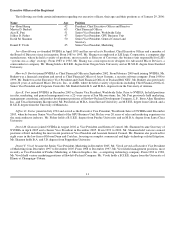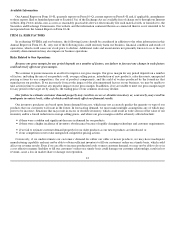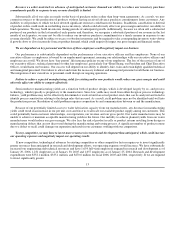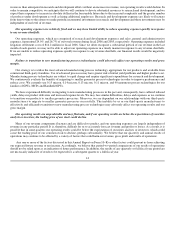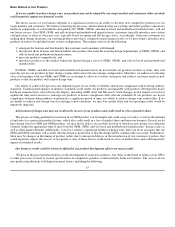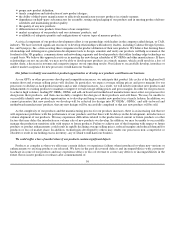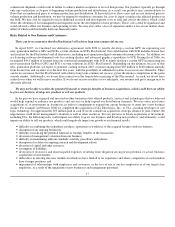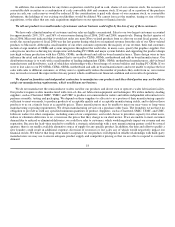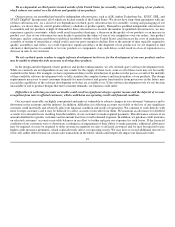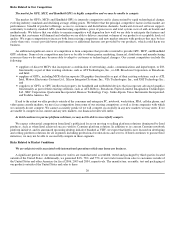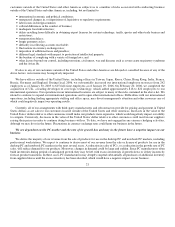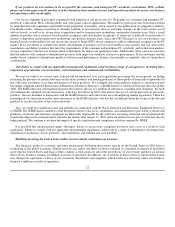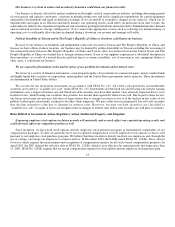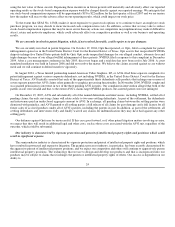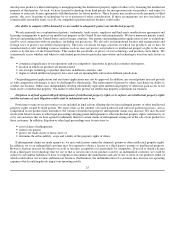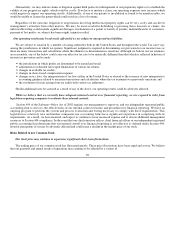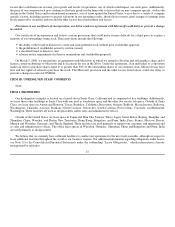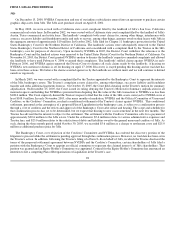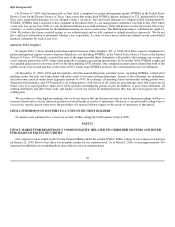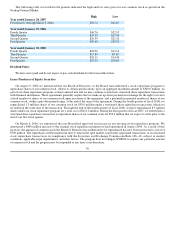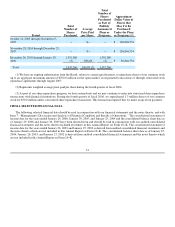NVIDIA 2006 Annual Report Download - page 27
Download and view the complete annual report
Please find page 27 of the 2006 NVIDIA annual report below. You can navigate through the pages in the report by either clicking on the pages listed below, or by using the keyword search tool below to find specific information within the annual report.
customers outside of the United States and other Americas subjects us to a number of risks associated with conducting business
outside of the United States and other Americas, including, but not limited to:
• international economic and political conditions;
• unexpected changes in, or impositions of, legislative or regulatory requirements;
• labor issues in foreign countries;
• cultural differences in the conduct of business;
• inadequate local infrastructure;
• delays resulting from difficulty in obtaining export licenses for certain technology, tariffs, quotas and other trade barriers and
restrictions;
• transportation delays;
• longer payment cycles;
• difficulty in collecting accounts receivable;
• fluctuations in currency exchange rates;
• imposition of additional taxes and penalties;
• different legal standards with respect to protection of intellectual property;
• the burdens of complying with a variety of foreign laws; and
• other factors beyond our control, including terrorism, civil unrest, war and diseases such as severe acute respiratory syndrome
and the Avian flu.
If sales to any of our customers outside of the United States and other Americas are delayed or cancelled because of any of the
above factors, our revenue may be negatively impacted.
We have offices outside of the United States, including offices in Taiwan, Japan, Korea, China, Hong Kong, India, France,
Russia, Germany and England. During fiscal 2006, we substantially increased our international employee resources from 242
employees as of January 30, 2005 to 615 full−time employees as of January 29, 2006. On February 20, 2006, we completed the
acquisition of ULi, a leading developer of core logic technology, which added approximately $18 to $22 employees to our
international operations. Our operations in our international locations are subject to many of the risks contained in the above list. We
intend to continue to expand our international operations and to open other international offices. Difficulties with our international
operations, including finding appropriate staffing and office space, may divert management's attention and other resources any of
which could negatively impact our operating results.
Currently, all of our arrangements with third−party manufacturers and subcontractors provide for pricing and payment in United
States dollars as are sales to our customers located outside of the United States and other Americas. Increases in the value of the
United States' dollar relative to other currencies would make our products more expensive, which would negatively impact our ability
to compete. Conversely, decreases in the value of the United States' dollar relative to other currencies could result in our suppliers
raising their prices in order to continue doing business with us. To date, we have not engaged in any currency hedging activities,
although we may do so in the future. Fluctuations in currency exchange rates could harm our business in the future.
We are dependent on the PC market and the rate of its growth has and may in the future have a negative impact on our
business.
We derive the majority of our revenue from the sale of products for use in the desktop PC and notebook PC markets, including
professional workstations. We expect to continue to derive most of our revenue from the sale or license of products for use in the
desktop PC and notebook PC markets in the next several years. A reduction in sales of PCs, or a reduction in the growth rate of PC
sales, will reduce demand for our products. Moreover, changes in demand could be large and sudden. Since PC manufacturers often
build inventories during periods of anticipated growth, they may be left with excess inventories if growth slows or if they incorrectly
forecast product transitions. In these cases, PC manufacturers may abruptly suspend substantially all purchases of additional inventory
from suppliers like us until the excess inventory has been absorbed, which would have a negative impact on our business.
21


